Do you find yourself lying awake at night, unable to sleep? Quality sleep is key to our health and happiness. This guide will share tips and strategies to help you sleep better and feel great.
If you often have trouble sleeping, this article has solutions for you. We’ll cover everything from making your bedroom sleep-friendly to relaxing techniques. By following these tips, you can improve your sleep and boost your daily life.
Key Takeaways
- Discover effective techniques to fall asleep faster
- Learn how to create a sleep-friendly environment for better rest
- Explore relaxation practices to calm your mind and body
- Understand the importance of a calming bedtime routine
- Uncover natural sleep aids and remedies to enhance sleep quality
Understanding the Importance of Quality Sleep
Sleep is key to our health and happiness. It helps control our circadian rhythm, the 24-hour cycle that tells us when to sleep and wake. Good sleep habits and routines bring many benefits for our body and mind.
The Impact of Sleep Deprivation on Physical and Mental Health
Not getting enough sleep can harm our bodies. Long-term sleep loss raises the risk of health problems, such as:
- Weakened immune system
- Cardiovascular problems
- Metabolic disorders, like obesity and type 2 diabetes
- Hormonal imbalances
- Cognitive impairment and difficulty concentrating
- Mood disturbances, including depression and anxiety
The Benefits of a Healthy Sleep Routine
Having a regular and sleep-optimized routine is good for us. It helps us feel better in many ways. With quality sleep, we can:
- Improve our thinking skills, like memory, focus, and making decisions
- Feel happier and manage our emotions better
- Have a stronger immune system and lower health risks
- Have more energy and perform better physically
- Manage our appetite and weight better
Knowing how sleep affects our health helps us make better choices. We can focus on sleep hygiene and create a sleep routine that boosts our well-being.
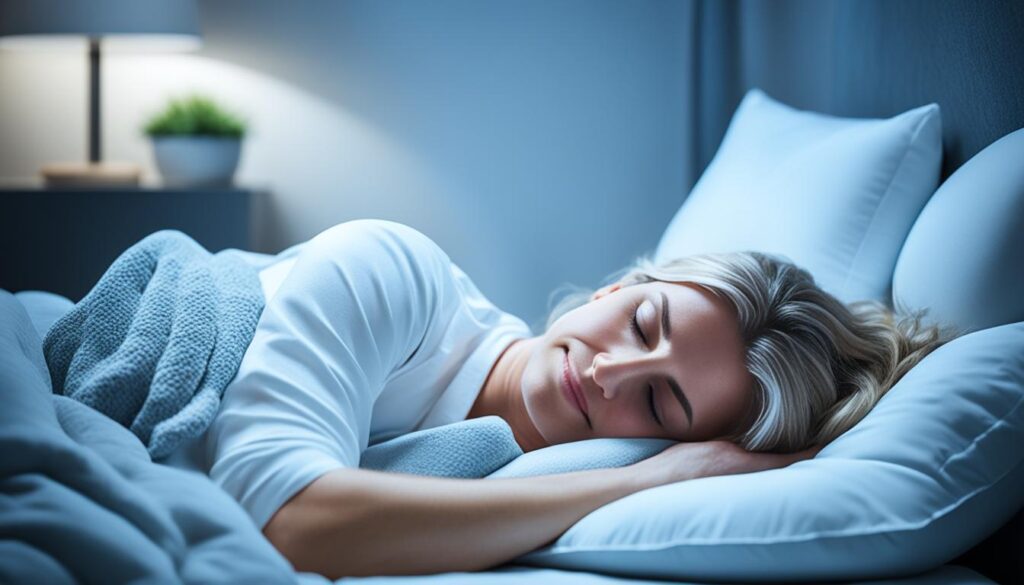
| Consequences of Sleep Deprivation | Benefits of a Healthy Sleep Routine |
|---|---|
|
|
“The secret of your future is hidden in your daily routine.” – Mike Murdock
Creating a Sleep-Friendly Environment
Making your bedroom sleep-friendly is key to better rest. By making your bedroom just right, you can help yourself sleep better and stay asleep. Here are some easy tips to make your bedroom perfect for sleep and improve your sleep environment improvement.
Optimizing Bedroom Conditions for Better Sleep
Your bedroom’s temperature, lighting, and noise affect your sleep. First, make sure it’s cool, dark, and quiet. A temperature between 65°F and 70°F is best for sleep.
- Use blackout curtains or blinds to block out light, which can mess with your sleep cycle.
- Think about getting a white noise machine or earplugs to block out noise and help you sleep better.
- Keep your bedroom tidy to make it calming and ready for sleep.
Everyone is different, so try various sleep environment improvement methods to see what works for you.
“The quality of your sleep environment can have a significant impact on the quality of your sleep.” – Sleep Expert, Dr. Sarah Johnson
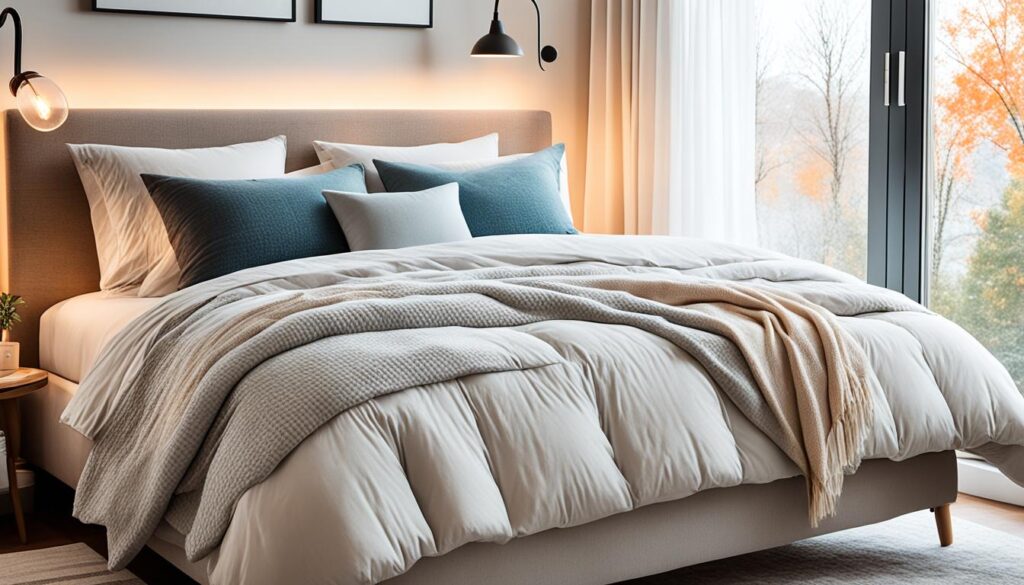
Creating a sleep-friendly space is a big step towards better sleep and health. Spend time making your bedroom ideal for sleep, and you’ll sleep better and feel refreshed.
Practicing Relaxation Techniques
Stress and anxiety can make it hard to fall asleep quickly. Luckily, there are ways to calm your mind and body. This makes it easier to drift off to sleep. We’ll look at some top relaxation techniques to help you sleep faster.
Deep Breathing Exercises
Deep breathing is a simple yet powerful way to relax. Focus on your breath and take slow, deep breaths. This starts your body’s relaxation response, lowering your heart rate and blood pressure.
Try inhaling for four seconds, holding for four seconds, and exhaling for six seconds. Do this cycle a few times until you feel more relaxed.
Progressive Muscle Relaxation
Progressive muscle relaxation means tensing and then relaxing different muscle groups. It makes you more aware of your body’s sensations and releases tension. Start with your toes, tense them for a few seconds, and then release.
Move up through your body, focusing on each muscle group. This helps you relax fully.
Guided Visualization
Guided visualization means imagining a peaceful scene in your mind. It could be a calm beach, a quiet forest, or any place that relaxes you. As you picture this scene, notice what you see, hear, smell, and feel.
This distracts your mind from racing thoughts and helps you relax.
Adding these relaxation techniques to your bedtime routine can change your sleep for the better. Try different methods to see what works best for you. Make them a regular part of your sleep routine.
Establishing a Calming Bedtime Routine
A consistent bedtime routine helps you fall asleep faster. It tells your body it’s time to relax and get ready for sleep. We’ll look at how mindfulness and meditation can help make your bedtime routine calming.
Incorporating Mindfulness and Meditation
Mindfulness and meditation are great for relaxation and better sleep. They help you focus on your breath and let go of stress. This makes it easier to move into deep, restful sleep.
- Try a simple breathing exercise, such as the 4-7-8 method, where you inhale for 4 seconds, hold for 7 seconds, and exhale for 8 seconds.
- Engage in a brief body scan, noticing any areas of tension or discomfort, and consciously releasing them.
- Visualize a peaceful, calming scene, such as a serene beach or a tranquil forest, to shift your focus away from anxious thoughts.
Adding just a few minutes of mindfulness or meditation to your bedtime routine can greatly improve your sleep. Try different techniques to see what works best for you. Make it a regular part of your bedtime.
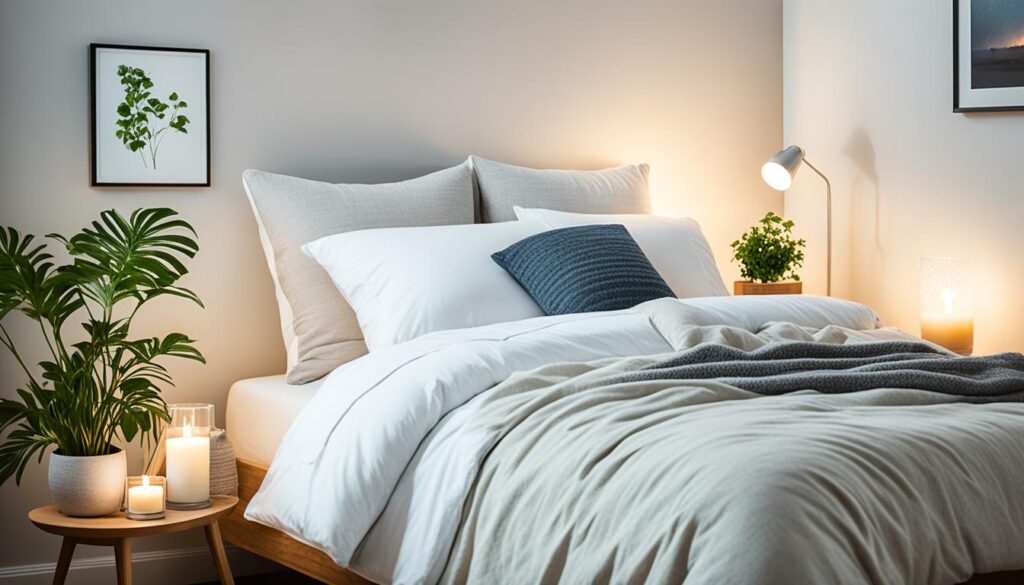
“Mindfulness is not about changing your thoughts or feelings, but rather about changing your relationship to them.”
Creating a calming bedtime routine with mindfulness and meditation helps you relax deeply. It also improves your sleep quality and makes you feel refreshed in the morning. Make it a habit to wind down this way every night.
Harnessing the Power of Cognitive Behavioral Therapy for Insomnia
If you’re having trouble sleeping, cognitive behavioral therapy for insomnia (CBT-I) might help. It’s a proven way to tackle sleep issues by changing your thoughts and actions. This therapy helps you spot and change the patterns that keep you awake.
CBT-I shows how our thoughts and actions affect our sleep. With a therapist, you’ll learn to spot and fight negative thoughts and bad habits. These habits can stop you from sleeping well.
CBT-I has lasting effects, unlike sleep drugs that only help for a short time. It teaches you skills to keep using even after therapy ends. The aim is to make good sleep habits a part of your life.
In CBT-I, you’ll try different methods, such as:
- Sleep restriction therapy – Limiting your time in bed to match your sleep needs.
- Stimulus control – Making your bed and bedroom only for sleeping, not for being awake.
- Relaxation techniques – Using deep breathing, meditation, and muscle relaxation to relax your mind and body.
CBT-I tackles the mental and behavioral causes of insomnia. It can lead to better sleep and overall health. If you want to improve your sleep, consider trying this therapy.
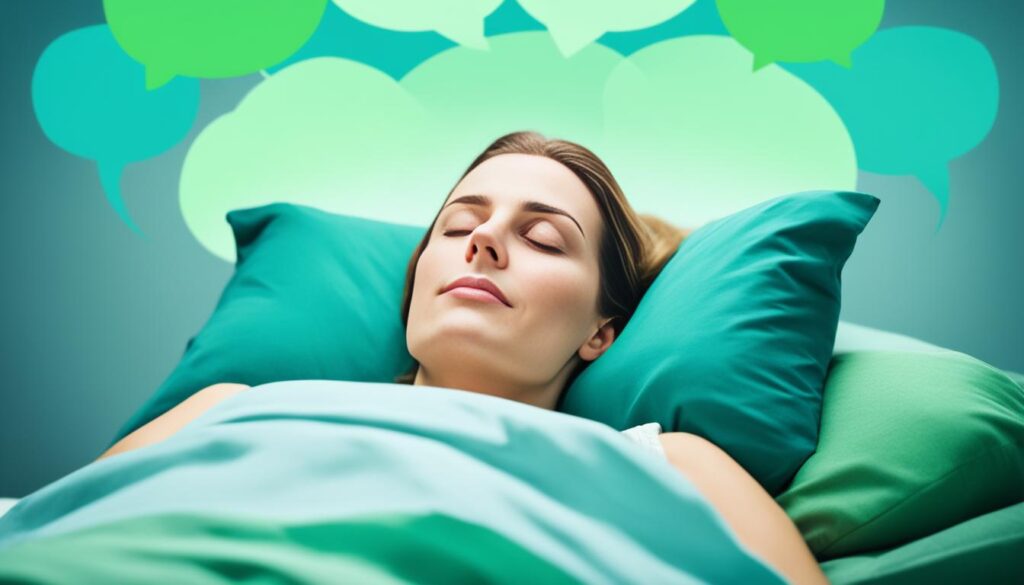
“CBT-I has been shown to be as effective as sleep medication, with the added benefit of lasting effects even after treatment has ended.”
fall asleep fast, sleep tips, sleep techniques, better sleep, insomnia solutions
If you find it hard to fall asleep or have trouble sleeping, you’re not alone. Many people worldwide struggle with insomnia and other sleep issues. Luckily, there are many effective ways to improve your sleep and beat these problems.
We’ll look at some proven tips and solutions to help you fall asleep fast, sleep better, and manage insomnia. By trying these methods, you can get the restful sleep your body and mind need.
Optimize Your Sleep Environment
Creating a sleep-friendly space is key for better sleep. Make sure your bedroom is cool, dark, and quiet with comfy bedding and few distractions. Try different temperatures, blackout curtains, and white noise machines to find what works best for you.
Establish a Calming Bedtime Routine
Having a calming bedtime routine tells your body it’s time to sleep. This could be light stretching, meditation, reading, or a warm bath. Avoid using electronic devices before bed to help you fall asleep fast.
Incorporate Relaxation Techniques
Relaxation techniques like deep breathing, progressive muscle relaxation, or guided imagery can ease stress and anxiety. These can help you sleep better. Adding these to your daily routine can be a strong sleep technique.
Explore Cognitive Behavioral Therapy for Insomnia (CBT-I)
Cognitive Behavioral Therapy for Insomnia (CBT-I) is a proven treatment for sleep issues. It focuses on changing thoughts and behaviors that affect sleep. This approach can help you sleep better and overcome mental barriers to sleep.
Utilize Natural Sleep Aids
Natural remedies like herbal supplements or essential oils might help with sleep. But, talk to a healthcare professional before trying them, as they could affect your other medications.
Remember, finding the right approach to sleep is key. By trying these strategies, you can take charge of your sleep and enjoy the benefits of being well-rested.
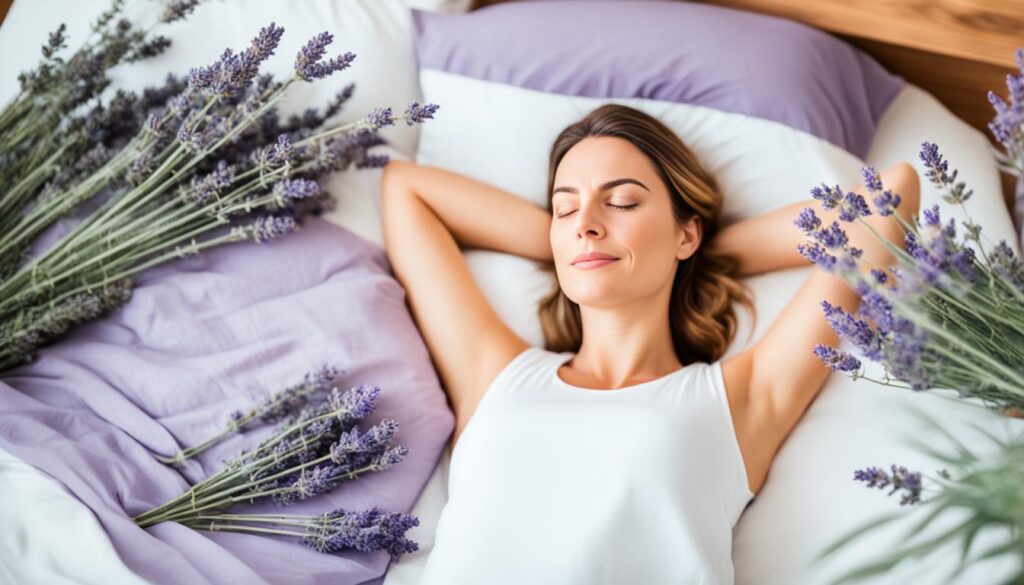
| Sleep Tip | Description |
|---|---|
| Stick to a Consistent Sleep Schedule | Stick to the same sleep schedule every day, even on weekends, to help your body’s internal clock. |
| Limit Exposure to Blue Light | Blue light from devices can disrupt your sleep cycle. Avoid devices a few hours before bed. |
| Engage in Regular Exercise | Regular exercise can improve sleep quality, but avoid intense workouts before bedtime. |
| Manage Stress and Anxiety | Use stress-reduction techniques like meditation or journaling to help you relax and sleep better. |
“Getting enough quality sleep is one of the most important things you can do for your overall health and well-being.” – Matthew Walker, author of “Why We Sleep”
Exploring Natural Sleep Aids
Changing our habits and behaviors is key to better sleep. But, some people also find help with natural sleep aids like herbal remedies and supplements. These options can help us sleep better at night.
The Role of Herbal Remedies and Supplements
Herbal remedies and supplements have been used for a long time to help us relax and sleep better. Some top natural sleep aids include:
- Valerian Root – This herb helps you fall asleep faster and sleep better.
- Chamomile – Known for calming you down, chamomile tea is a popular sleep aid.
- Melatonin – This hormone helps control when you sleep and wake up. Taking melatonin supplements can also help you sleep.
- Lavender – The smell of lavender can make you feel relaxed, making it a great sleep aid.
Remember, these natural sleep aids might work for some people. But, always talk to a doctor before trying them, especially if you have health issues or take other medicines.
| Natural Sleep Aid | Potential Benefits | Considerations |
|---|---|---|
| Valerian Root | Reduces time to fall asleep, improves sleep quality | May cause side effects such as headaches, dizziness, or gastrointestinal issues |
| Chamomile | Promotes relaxation, aids in falling asleep | Generally considered safe, but may interact with certain medications |
| Melatonin | Helps regulate the sleep-wake cycle, supports falling and staying asleep | Dosage and timing are crucial; can cause drowsiness the next day if not used properly |
| Lavender | Provides a calming effect, may improve sleep quality | Generally well-tolerated, but some individuals may be sensitive to the scent |
Looking into natural sleep aids can give us more ways to help our sleep. It can make our efforts to sleep better even stronger.

Managing Stress and Anxiety for Better Sleep
Stress and anxiety can make it hard to sleep well. But, we can use certain strategies to help. These methods make it easier to get good sleep. Let’s look at some ways to beat stress and anxiety for better sleep.
First, it’s key to practice stress-reduction techniques. You can try deep breathing, muscle relaxation, or mindfulness meditation. These activities calm your mind and body, making it easier to relax before bed.
Regular physical exercise is also important for handling stress and anxiety. Activities like yoga, walking, or swimming help release tension and improve sleep. Just remember, don’t work out too close to bedtime, as it might keep you awake.
Adding relaxation practices to your day can also help a lot. You might enjoy a warm bath, reading a book, or doing a hobby you love. These things take your mind off stressful thoughts and help you relax before sleep.
“The best bridge between despair and hope is a good night’s sleep.” – E. Joseph Cossman
Using these strategies together can help you manage stress and anxiety. This makes it easier to get restful and restorative sleep. It might take some trying to find what works for you, but it’s worth it for your sleep health.
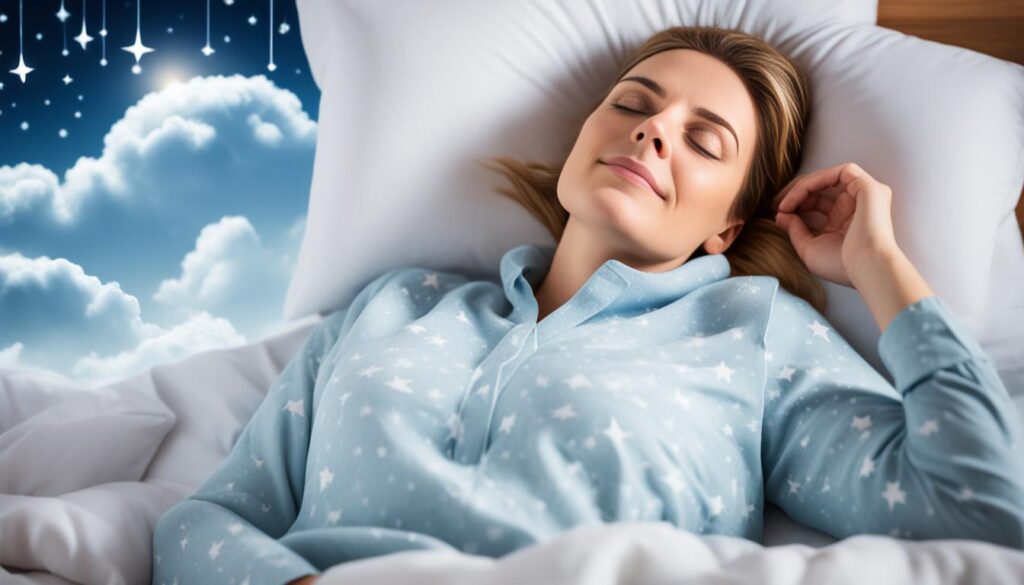
| Stress Management Technique | Benefits for Sleep |
|---|---|
| Deep Breathing Exercises | Reduces physiological arousal, promoting relaxation and better sleep |
| Regular Exercise | Alleviates stress and anxiety, improving overall sleep quality |
| Mindfulness Meditation | Calms the mind, reduces rumination, and facilitates a smoother transition to sleep |
| Relaxing Activities | Distracts from stressful thoughts and creates a sense of tranquility before bed |
The Impact of Diet and Exercise on Sleep Quality
Getting good sleep is key, and what you eat and how you move play big roles. Eating right and staying active can help you sleep better. Let’s look at how nutrition and exercise affect your sleep.
Nutrition and Sleep: Understanding the Connection
What you eat affects your sleep. Some foods help you sleep better, while others can make it harder. Foods high in tryptophan, for example, can make you sleepy. But, eating too much sugar or caffeine can mess up your sleep.
Eating a balanced diet with whole foods can improve your sleep. Foods like fatty fish, nuts, and leafy greens are good choices. They help keep your sleep patterns healthy.
When you eat also matters for your sleep. Try to eat your last big meal a few hours before bed. This lets your body digest food and avoids sleep problems.
The Role of Exercise in Sleep Quality
- Regular exercise improves sleep quality.
- Working out, like running or lifting weights, helps you fall asleep faster and sleep better.
- But, don’t work out too close to bedtime. It can keep you awake.
- Finish your exercise a few hours before bed to relax.
Knowing how diet, exercise, and sleep are connected helps you make better choices. These choices can improve your sleep and overall health.

Addressing Sleep Disorders and Seeking Professional Help
Some sleep issues might need help from a professional. It’s key to know the signs of sleep disorders like sleep apnea or narcolepsy. If you think you have one, see a healthcare expert.
Sleep disorders can really hurt your health and daily life. They can make sleep poor and affect your daily life. If not treated, they can cause heart problems, brain issues, and mental health problems.
If you think you have a sleep disorder, talk to a sleep specialist or your doctor. They can check you out with sleep studies or tests. Then, they can make a plan to help you sleep better.
Common Sleep Disorders and Symptoms
- Sleep apnea: This means you stop breathing a lot while you sleep. It makes sleep poor and you feel tired during the day.
- Insomnia: This is when you can’t sleep well or wake up too early. It makes you feel bad during the day.
- Restless Leg Syndrome (RLS): You feel like you must move your legs a lot, and they hurt. This can make it hard to sleep.
- Narcolepsy: This is a condition where you feel very sleepy during the day and might fall asleep suddenly.
If you keep having sleep problems or notice these symptoms, get help. A sleep expert can check you out, suggest treatments, and help you sleep better.
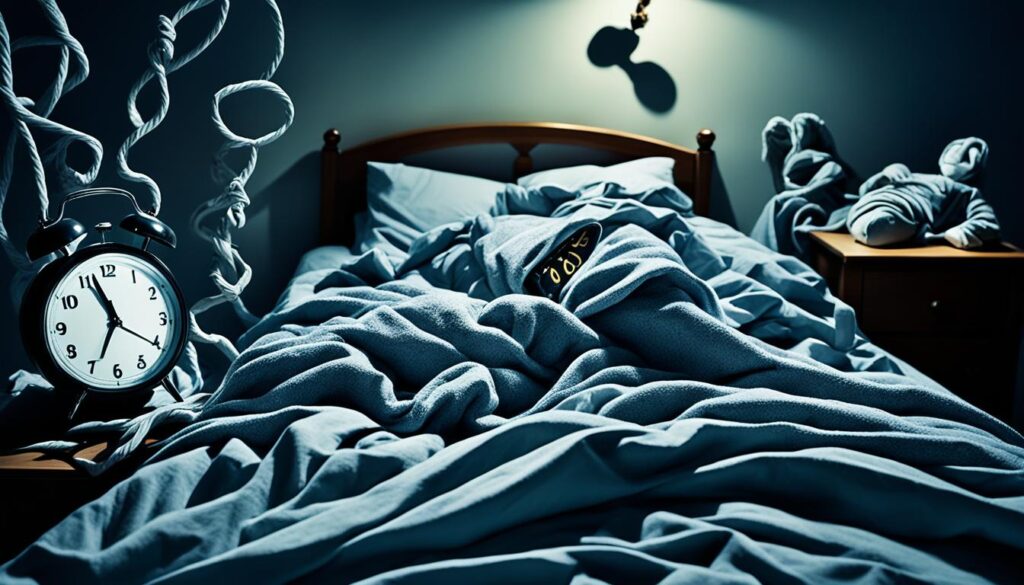
| Sleep Disorder | Symptoms | Treatment Options |
|---|---|---|
| Sleep Apnea | Loud snoring, pauses in breathing, daytime fatigue | CPAP therapy, oral appliances, lifestyle changes |
| Insomnia | Difficulty falling asleep, staying asleep, early waking | Cognitive Behavioral Therapy for Insomnia (CBT-I), sleep hygiene, medication (if necessary) |
| Restless Leg Syndrome (RLS) | Uncontrollable urge to move the legs, uncomfortable sensations | Medications, lifestyle changes, addressing underlying conditions |
| Narcolepsy | Excessive daytime sleepiness, sudden episodes of falling asleep | Medications, lifestyle adjustments, cognitive-behavioral therapy |
Getting help from a professional is key to fixing sleep disorders and improving your sleep. With a sleep expert, you can get a plan that works for you. This can make your sleep better and improve your health.
Developing Healthy Sleep Habits
Creating good sleep hygiene habits is key for better sleep over time. We’ll talk about how being consistent and disciplined helps. This includes setting a regular sleep schedule, making your bedroom sleep-friendly, and following healthy sleep tips.
Consistency and Discipline: Keys to Success
Having steady sleep habits is the base of good sleep hygiene. A regular sleep schedule, where you go to bed and wake up at the same time every day, can make your sleep better. It’s important to stick to your schedule, even on weekends, to keep your body’s clock in check.
- Maintain a consistent sleep-wake schedule, even on weekends
- Establish a relaxing bedtime routine to cue your body for sleep
- Optimize your sleep environment by keeping it cool, dark, and quiet
- Avoid screens and stimulating activities close to bedtime
- Engage in regular exercise, but not too close to bedtime
| Healthy Sleep Habit | Benefit |
|---|---|
| Consistent sleep-wake schedule | Regulates the body’s internal clock for better sleep |
| Relaxing bedtime routine | Signals the brain to prepare for sleep |
| Optimal sleep environment | Minimizes distractions and promotes restful sleep |
| Avoiding screens before bed | Reduces exposure to blue light that can disrupt sleep |
| Regular exercise | Improves sleep quality and duration |
Building healthy sleep hygiene habits takes time and effort, but it’s worth it. With consistent practice and discipline, you can achieve better sleep for the long run.
Overcoming Common Sleep Challenges
Getting a good night’s sleep can be hard for many people. Even with good sleep habits, you might face sleep problems. We’ll look at common sleep issues and offer insomnia solutions to help you.
Difficulty Falling Asleep
If you can’t fall asleep, try these tips:
- Start a bedtime routine, like taking a warm bath or doing some light stretching, to tell your body it’s time to sleep.
- Avoid screens (phones, tablets, TVs) for an hour before bed, as they can mess with your sleep cycle.
- Try relaxation methods like deep breathing, meditation, or progressive muscle relaxation to relax your mind and body.
Frequent Nighttime Awakenings
If you wake up a lot at night, here’s what you can do:
- Make sure your bedroom is dark, cool, and quiet, as these things can affect your sleep.
- Don’t have caffeine, alcohol, or big meals before bed, as they can make it hard to stay asleep.
- If you wake up and can’t go back to sleep in 20 minutes, get up and do something relaxing until you feel sleepy again.
Daytime Drowsiness
Feeling tired during the day can be annoying. Here are some insomnia solutions to help:
- Add regular exercise to your day, as it can make your sleep better and give you more energy.
- Avoid long naps during the day, as they can mess with your sleep cycle.
- Drink plenty of water and eat well, as not getting enough nutrients can make you feel tired.
Everyone’s sleep needs and problems are different. If you keep having trouble sleeping, talk to a healthcare professional. They can offer insomnia solutions tailored to you.
Personalizing Your Sleep Routine
Everyone’s sleep needs and preferences are different. It’s key to make your sleep routine your own for the best rest and energy boost.
Try out various strategies and see how you feel. What works for someone else might not work for you. Notice your sleep patterns, bedtime habits, and what affects your sleep quality.
- Keep a regular sleep schedule but adjust it as needed.
- Try different relaxation methods like meditation, deep breathing, or stretching to see what helps you relax best.
- Change your bedroom’s lighting, temperature, and noise until you find the perfect setting for sleep.
There’s no single way to improve sleep that works for everyone. Be open to finding what works for you and be patient. With time and trying different things, you can find the sleep routine that helps you feel great.
| Sleep Optimization Strategies | Potential Benefits |
|---|---|
| Consistent Sleep Schedule | Improved Circadian Rhythm, Enhanced Sleep Quality |
| Personalized Relaxation Techniques | Reduced Stress and Anxiety, Faster Sleep Onset |
| Customized Bedroom Environment | Optimal Sleeping Conditions, Uninterrupted Sleep |
“The best sleep of my life came after I started tailoring my sleep routine to my individual needs and preferences.”
By making your sleep routine personal, you can get the most out of sleep. This leads to better physical and mental health.
Tracking Your Progress and Adjusting Strategies
It’s key to keep an eye on your sleep and tweak your strategies for better sleep over time. Use sleep tracking apps or a sleep journal to monitor your sleep patterns. This helps you see what you’re doing right and what needs work.
Looking at your sleep data can reveal what affects your sleep quality. This includes your bedtime routine, the environment you sleep in, and how stressed you are. With this info, you can adjust your sleep plan to fit what works for you. This might mean changing your bedtime habits, making your bedroom sleep-friendly, or trying new ways to relax before bed.
Everyone’s sleep needs and likes are different. So, what helps one person sleep well might not help you. By watching your progress and trying new things, you can create a sleep routine that works for you. This leads to better sleep and better health overall.

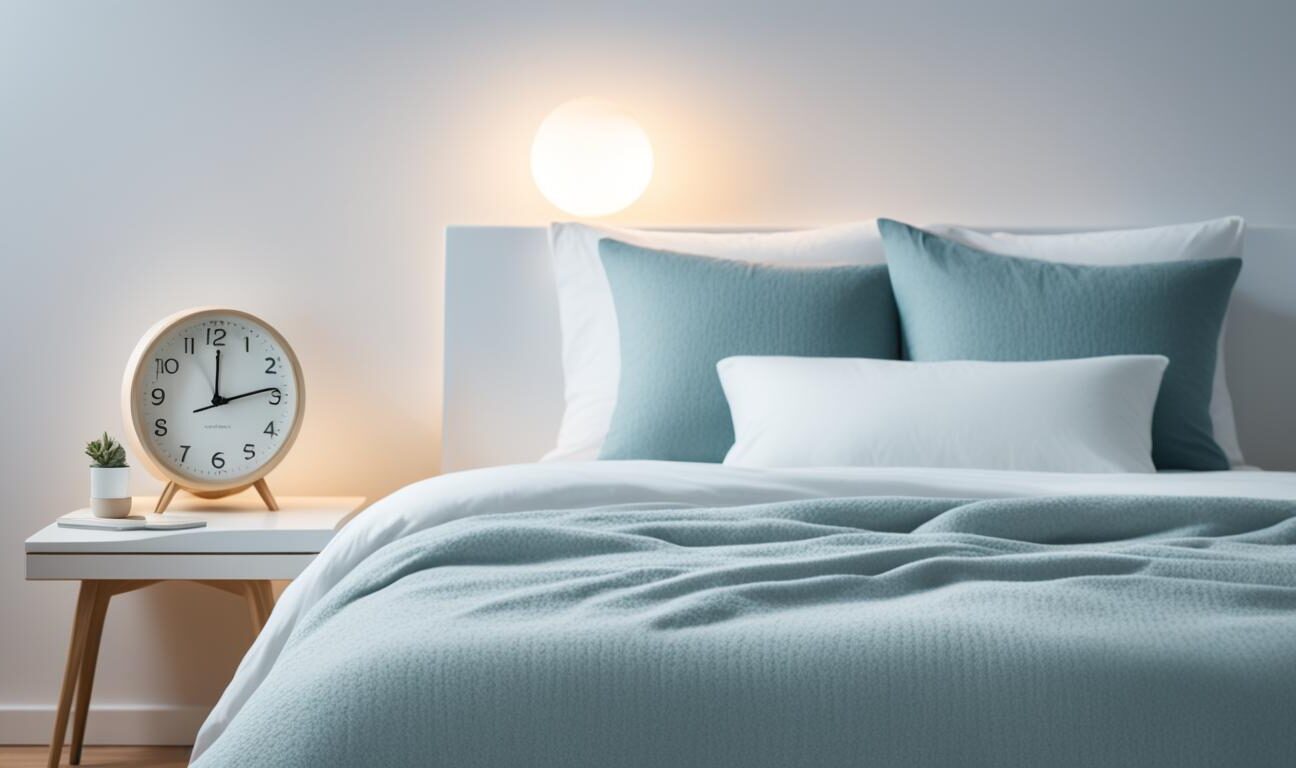




Leave feedback about this